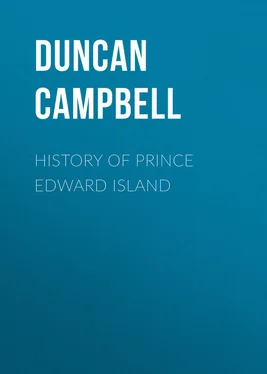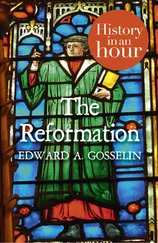Duncan Campbell - History of Prince Edward Island
Здесь есть возможность читать онлайн «Duncan Campbell - History of Prince Edward Island» — ознакомительный отрывок электронной книги совершенно бесплатно, а после прочтения отрывка купить полную версию. В некоторых случаях можно слушать аудио, скачать через торрент в формате fb2 и присутствует краткое содержание. ISBN: , Жанр: foreign_antique, foreign_prose, Историческая проза, на английском языке. Описание произведения, (предисловие) а так же отзывы посетителей доступны на портале библиотеки ЛибКат.
- Название:History of Prince Edward Island
- Автор:
- Жанр:
- Год:неизвестен
- ISBN:http://www.gutenberg.org/ebooks/35835
- Рейтинг книги:3 / 5. Голосов: 1
-
Избранное:Добавить в избранное
- Отзывы:
-
Ваша оценка:
- 60
- 1
- 2
- 3
- 4
- 5
History of Prince Edward Island: краткое содержание, описание и аннотация
Предлагаем к чтению аннотацию, описание, краткое содержание или предисловие (зависит от того, что написал сам автор книги «History of Prince Edward Island»). Если вы не нашли необходимую информацию о книге — напишите в комментариях, мы постараемся отыскать её.
History of Prince Edward Island — читать онлайн ознакомительный отрывок
Ниже представлен текст книги, разбитый по страницам. Система сохранения места последней прочитанной страницы, позволяет с удобством читать онлайн бесплатно книгу «History of Prince Edward Island», без необходимости каждый раз заново искать на чём Вы остановились. Поставьте закладку, и сможете в любой момент перейти на страницу, на которой закончили чтение.
Интервал:
Закладка:
A Mr. John Stuart, 5 5 This gentleman was not John Stewart, of Mount Stewart. The latter was only twenty-three years of age when John Stuart was appointed by the assembly their agent in London, and he had been only three years on the island at the time of the appointment. His Honor Sir Robert Hodgson, the Lieutenant Governor, has taken the trouble to peruse the correspondence which passed between Governor Patterson and John Stuart, and in a note addressed to the writer, says: “I feel convinced that John Stuart was the person whose name appears on the Island Statute of 30 George III, cap. 5, of the year 1790, as the owner of ten thousand acres of land; and who, I have always understood, was a personal friend of Governor Patterson, and if not an original grantee, must have acquired his land by the instrumentality of his friend the governor, under the sale of the lands for the non-payment of quitrents, so frequently alluded to in the correspondence.” The writer has carefully gone over the list of original grantees, in which there is one named John Stewart, but not one who spelt his name Stuart.
an intimate friend of Governor Patterson, and who had resided in London for fourteen years, was in 1781 appointed by the house of assembly as their London agent. We have been favored with the perusal of a number of private and confidential letters which passed between the governor and this gentleman. These throw considerable light on the island history of this period. The sales of land recently made excited intense indignation against the governor on the part of those whose property had been confiscated, who were backed in their applications for redress by the general body of proprietors. The act sent to the governor, and which he failed to present to the house of assembly, was the result of these applications. In the preamble of that portion of the act which provided for relief to the complainants, it was stated that the governor and council, on the first day of December, 1780, unanimously resolved, in order to give absent proprietors whose lands were liable to be sold an opportunity of relieving their property, that no sales should take place until the first Monday of November following, and that in the meantime the colonial agent in London should be instructed to inform the proprietors of the proposed sale; and “whereas,” runs the act, “notwithstanding such determination and resolution, no such notice was given by the colonial agent to the proprietors, it seems reasonable that they should obtain effectual relief in the premises.” It is only fair that the governor should be allowed to reply in his own words, as contained in a letter now before us, which he addressed to his friend Stuart on the twelfth of May, 1783. In order that a portion of that letter may be understood, it is necessary to say that Captain McDonald, one of the proprietors resident in London, had written a pamphlet reflecting on the conduct of the governor in disposing of the land, which contributed in no small degree, as Mr. Stuart affirms, in causing the act of relief to be prepared. After referring to business matters, which have no bearing on our story, the governor says: “What appears most pressing at present is to say something in answer to my friend Captain McDonald’s proceedings. But first I must express my astonishment at your not having received any letters from me since December, 1781. I wrote and sent two by the express, which went to the continent in February, 1782, – not to you, indeed, because I thought you had sailed for India; but Mr. Townshend received them, I am certain, for I have answers to them from you. I wrote a long one to you in October, 1782, on a variety of subjects. If this letter has not reached you, I am very unfortunate, as I have no copy of it. I wrote you three others in the course of the winter, copies of which shall accompany this, though they will be now, I fear, of little use, except to show that I have not been idle, or negligent in my attention to the interests of this government. If I succeed, I may be rewarded by my own feelings, but as to any grateful returns, I expect them not. In bodies of men there is no such virtue as gratitude, nor indeed but very rarely in individuals. I feel this, and in few instances more sensibly than in the behaviour of Captain McDonald. Believe me, my friend, I have rendered him and his family many disinterested and essential services; nor do I know that I can let an opportunity slip of doing so, when in my power. But now , when he thinks his interest is in the least affected, he becomes my enemy, and that, too, in a matter where I am only a spectator, or rather, when I ought to have been only such; for the fact is, I did step out of my line in the business of forfeiting the lots, but then it was only to continue my wonted practice to benefit the proprietors. For this purpose I advised sending the advertisements to England, which the law did not require. I, by the advice of council, postponed the sales from time to time, in hopes the proprietors would take some steps in consequence of the advertisements, and, with this view, prevented their taking place till the latter end of November, when every hope was over. This the law did not require, and the advertisements not reaching England in time was not my fault, as the resolution of council directing their being sent is dated twenty-sixth November, 1780, and the sales did not take place for a year afterwards. I did more: I prevented all the lots from being sold belonging to proprietors who I knew were inclined to improve their lands, and this I did by taking the debt upon myself, which was not required by the law, nor perhaps in justice to my own family; nor do I believe there is an instance of such conduct in any other man. Among the number so saved is the lot belonging to this same Captain McDonald, though I had no hopes of his paying his quitrents, or of his doing any one thing relative to the settling of it; for he has repeatedly told me himself that he would not, as he thought he had engaged to pay too much money for it to the chief baron from whom he bought it. What I did was out of tenderness to his sisters, who live upon the lot, and to give him time to think better. I saved Lord Townshend’s, the chief baron’s, etc., and, in short, what I thought worth the saving, – and all at my own risk. I have done still more, for I have prevented any further sales since the first. This I also did for the benefit of the proprietors, knowing the lands would not bring their value; and I did it at the risk of my commission, for I did it in the face of a positive order from the treasury. So far, I hope I am not to blame.
“As to the regularity and legality of the proceedings in other respects, I am not accountable. The lands were seized in terms of a law passed near ten years since, and the proceedings conducted by the law officers, – I have no doubt properly.
“There is some idea, I find, of rescinding the purchases, and that government will order it. Whoever has formed such an idea must have strange notions of government. Government may order me; and, if I have a mind to be laughed at, I may issue my orders to the purchasers; but can anyone believe they will be obeyed? Surely not; nor would I be an inhabitant of any country where such a power existed. My money may with as much justice be ordered out of my pocket, or the bread out of my mouth. A governor has just as much power to do the one as the other. I should like to know what opinion you would have of a country where the validity of public contracts depended on the will of the governor.
“The purchases were made in the very worst period of the war, when the property was very precarious indeed, and when no man in England would have given hardly a guinea for the whole island. It is now peace, and fortunately we still remain a part of the British Empire. The lands are consequently esteemed more valuable, and the proprietors have become clamorous for their loss. Had the reverse taken place, – had the island been ceded to France, – let me ask, what would have been the consequence? Why, the purchasers would have lost their money, and the proprietors would have been quiet, hugging themselves on their own better judgment. There can be no restoring of the lots which were sold. There has not been a lot sold on which a single shilling has been expended by way of settlement, nor upon which there has been a settler placed; so that those proprietors who have expended money in making settlements have no cause of complaint.”
Читать дальшеИнтервал:
Закладка:
Похожие книги на «History of Prince Edward Island»
Представляем Вашему вниманию похожие книги на «History of Prince Edward Island» списком для выбора. Мы отобрали схожую по названию и смыслу литературу в надежде предоставить читателям больше вариантов отыскать новые, интересные, ещё непрочитанные произведения.
Обсуждение, отзывы о книге «History of Prince Edward Island» и просто собственные мнения читателей. Оставьте ваши комментарии, напишите, что Вы думаете о произведении, его смысле или главных героях. Укажите что конкретно понравилось, а что нет, и почему Вы так считаете.












